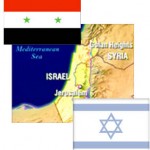Tuesday
Mar232010
Middle East Inside Line: Britain Expelling Israeli Diplomat, Cost of Settlements, Israel on Rising Insecurity
 Tuesday, March 23, 2010 at 15:38
Tuesday, March 23, 2010 at 15:38  London Expels Israeli Diplomat over Dubai Assassination: Britain is expelling an Israeli diplomat over the use of forged British passports in the assassination of Hamas chief Mahmoud al-Mabhouh in Dubai, according to a British Foreign Office official.
London Expels Israeli Diplomat over Dubai Assassination: Britain is expelling an Israeli diplomat over the use of forged British passports in the assassination of Hamas chief Mahmoud al-Mabhouh in Dubai, according to a British Foreign Office official.The British Foreign Office said Foreign Secretary David Miliband is making a statement on the matter at 1530 GMT.
The Cost of the Israeli Settlements: According to a study by the Macro Center for Political Economics, Israeli settlements in the West Bank encompass 12 million square meters of roads, homes and factories that cost more than $17 billion to build.
Macro director general Dr. Robi Nathanson said: "The logic behind the economic calculation is to assess the cost of construction and infrastructure in the settlement enterprise. This isn't market value, but rather the cost of building infrastructure."
The Israel Air Force bombed a Gaza City weapons storage facility overnight Monday. On Tuesday morning, the Israel Defense Forces spokesperson said, "The IDF will not tolerate any attempt to harm the citizens of the State of Israel and will continue to operate firmly against anyone who uses terror against it."
On Tuesday, Israel Defense Forces Chief of Staff Gabi Ashkenazi briefed the Knesset Foreign Affairs and Defense Committee on the security situation along Israel's border. He talked about three topics: the Iranian nuclear issue, increased firing of Qassam rockets from the Gaza Strip, and Hezbollah's situation in Lebanon.
On the Iranian nuclear issue, he said: "The Iranians are pressing ahead with their nuclear program. I hope that the trilateral sanctions will prove effective." He also added that it would be a mistake to rely on the opposition within Iran to neutralize the program's progress, as "the [Iranian] regime is strong and effective".
As for the northern border, he said that it is quiet "but that could change" since "Hezbollah is deploying more forces north of the Litani River."
Ashkenazi stated that Hamas was not behind the attacks from Gaza but added that the IDF will retaliate against Hamas targets since they see Hamas as "the sovereign group" in the territory.
Meanwhile, the IDF is investigating two West Bank incidents in which Israeli soldiers shot dead four Palestinians in less than 24 hours.


